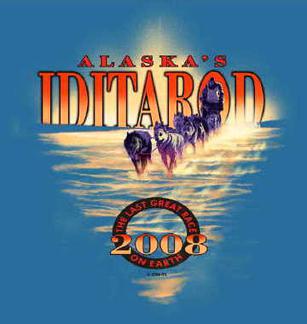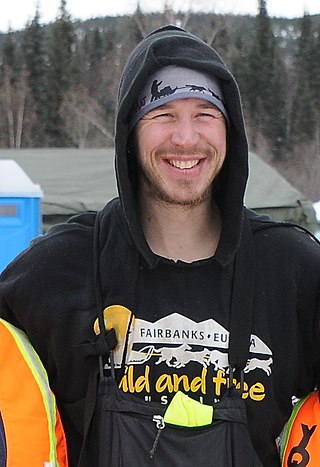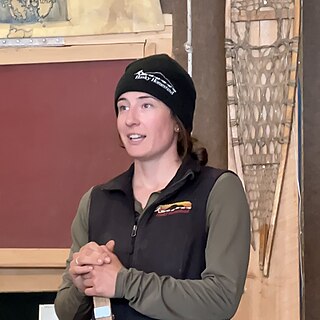Related Research Articles

The Iditarod Trail Sled Dog Race, more commonly known as The Iditarod, is an annual long-distance sled dog race held in Alaska in early March. It travels from Anchorage to Nome. Mushers and a team of between 12 and 16 dogs, of which at least 5 must be on the towline at the finish line, cover the distance in 8–15 days or more. The Iditarod began in 1973 as an event to test the best sled dog mushers and teams but evolved into today's highly competitive race.

A sled dog is a dog trained and used to pull a land vehicle in harness, most commonly a sled over snow.

Sled dog racing is a winter dog sport most popular in the Arctic regions of the United States, Canada, Russia, Greenland and some European countries. It involves the timed competition of teams of sled dogs that pull a sled with the dog driver or musher standing on the runners. The team completing the marked course in the least time is judged the winner.

Susan Howlet Butcher was an American dog musher, noteworthy as the second woman to win the Iditarod Trail Sled Dog Race in 1986, the second four-time winner in 1990, and the first to win four out of five sequential years. She is commemorated in Alaska by the Susan Butcher Day.

A dog sled or dog sleigh is a sled pulled by one or more sled dogs used to travel over ice and through snow, a practice known as mushing. Numerous types of sleds are used, depending on their function. They can be used for dog sled racing. Traditionally in Greenland and the eastern Canadian Arctic the Inuit had the dogs pull in a fan shape in front of the sled, while in other regions, such as Alaska and the western part of Northern Canada the dogs pull side by side in pairs.

The Iditarod Trail, also known historically as the Seward-to-Nome Trail, is a thousand-plus mile (1,600 km) historic and contemporary trail system in the US state of Alaska. The trail began as a composite of trails established by Alaskan native peoples. Its route crossed several mountain ranges and valleys and passed through numerous historical settlements en route from Seward to Nome. The discovery of gold around Nome brought thousands of people over this route beginning in 1908. Roadhouses for people and dog barns sprang up every 20 or so miles. By 1918 World War I and the lack of 'gold fever' resulted in far less travel. The trail might have been forgotten except for the 1925 diphtheria outbreak in Nome. In one of the final great feats of dog sleds, twenty drivers and teams carried the life-saving serum 674 miles (1,085 km) in 127 hours. Today, the Iditarod Trail Sled Dog Race serves to commemorate the part the trail and its dog sleds played in the development of Alaska, and the route and a series of connecting trails have been designated Iditarod National Historic Trail.

Jeff King is an American musher and sled dog racer. He is generally credited with introducing the sit-down sled which has largely replaced the standing sled traditionally used by distance mushers.

Leonhard "Sepp" Seppala was a Norwegian-Kven-American sled dog breeder, trainer and musher who with his dogs played a pivotal role in the 1925 serum run to Nome, and participated in the 1932 Winter Olympics. Seppala introduced the work dogs used by Native Siberians at the time to the American public; the breed came to be known as the Siberian Husky in the English-speaking world. The Leonhard Seppala Humanitarian Award, which honors excellence in sled dog care, is named in honour of him.
Libby Riddles is an American dog musher, and the first woman to win the Iditarod Trail Sled Dog Race.

John Quniaq Baker is a self-employed American dog musher, pilot and motivational speaker of Inupiaq descent who once consistently placed in the top 10 during the long distance Iditarod Trail Sled Dog Race. Baker won the 2011 Iditarod with a finish time of 8 Days 19 Hours 46 Minutes 39 Seconds.

Lance Mackey was an American dog musher and dog sled racer from Fairbanks, Alaska. Mackey was a four-time winner of both the 1,000-mile (1,600 km) Yukon Quest and the Iditarod Trail Sled Dog Race.

The 2008 Iditarod featured 95 mushers and dog teams. The 36th Annual Iditarod Trail Sled Dog Race ceremonially began on Saturday March 1, 2008. The competitive start was the next day.

Newton Marshall is a professional independent dogsled musher.
Mel Andrews is a British adventurer and athlete, specializing as a Musher in Dogsled Racing. On 5 February 2013, she became the first British woman to finish Europe's biggest sled dog race, Femundløpet. A month later Andrews broke the record for fastest GB rookie to finish the World's longest 8-dog race Finnmarksløpet.

Aliy Zirkle is an American champion of sled dog racing.

Brent Sass is an American dog musher who is one of only six people to have won both the Iditarod and Yukon Quest sled dog races.

The 2019 Iditarod is the 47th iteration of the Iditarod Trail Sled Dog Race held in Alaska. The race began on March 2, 2019, in Anchorage, Alaska, and ended on March 18, 2019, in Nome, Alaska.
Apayauq Reitan is an Iñupiaq dog musher from Norway. She participated in the 2019 Iditarod as a rookie, finishing in 28th place in 12 days, 5 hours, 15 minutes, and 17 seconds. She also ran the Yukon Quest that year, also as a rookie. In 2022, she became the first openly transgender woman to compete in the Iditarod. She is a citizen of both Norway and the United States.

Amanda Otto is an American musher and sled dog racer. In 2022, she made her rookie run with a team of Alaskan huskies in the Iditarod, and in 2023, placed second in the Yukon Quest, where she was cited by race organizers and race veterinarians, in a rare unanimous decision, for exemplary treatment of her dogs.
References
- 1 2 Emily Burack (February 8, 2018). "Meet Blair Braverman: Jewish Dogsled Racer, Writer, and Overall Badass". Alma. Archived from the original on 18 January 2017.
- 1 2 3 4 5 Collins, Stephen (Fall 2016). "Tough Sledding". Colby Magazine. Waterville, Maine: Colby College. Archived from the original on 22 October 2016. Retrieved 4 June 2017.
- 1 2 3 Mumford, Tracy (July 13, 2016). "Wild, free and freezing: Blair Braverman's life in the north". Minneapolis–Saint Paul, Minnesota: Minnesota Public Radio. Archived from the original on 4 May 2017. Retrieved 4 June 2017.
- ↑ "GIRL ON FIRE (AND ICE)". Brooklynrail.org, July–August 2016. 11 July 2016.
- 1 2 Driver, Alice (6 July 2016). "Mush, mush, mush! How husky racing saved an author and inspired a memoir". The Guardian . London, England. Archived from the original on 10 July 2016. Retrieved 4 June 2017.
- 1 2 Berry, Erica (July 18, 2016). "The Rumpus Interview with Blair Braverman". The Rumpus. Archived from the original on 19 July 2016. Retrieved 4 June 2017.
- ↑ Blair Braverman (July 25, 2016). "What I've Learned From Having A Trans Partner". Buzzfeed Newsfeed. Archived from the original on 18 January 2017.
- ↑ Dickey, Bronwen (2016-08-05). "A Woman's Love Affair With the North Is Both Travelogue and Memoir". The New York Times. New York City, New York. ISSN 0362-4331. Archived from the original on 8 August 2016. Retrieved 2017-03-29.
- ↑ Miller, Pamela (July 5, 2016). "Review: Welcome to the Goddamn Ice Cube, by Blair Braverman". The Star Tribune . Minneapolis, Minnesota. Archived from the original on 7 May 2017. Retrieved 4 June 2017.
- ↑ Stokes, Elisabeth Fairfield (November 14, 2016). "A Conversation With Blair Braverman, Author of 'Welcome to the Goddamn Ice Cube'". Pacific Standard . Santa Barbara, California: Miller-McCune Center for Research, Media and Public Policy. ISSN 1941-5672. Archived from the original on 4 June 2017. Retrieved 4 June 2017.
- ↑ "Welcome to the Goddamn Ice Cube". Vancouver Public Library. Vancouver, British Columbia, Canada. May 9, 2016. Archived from the original on 4 June 2017. Retrieved 4 June 2017.
- ↑ "Blair Braverman on her novel 'Small Game' about a survival reality tv show gone wrong". NPR. October 30, 2022.
- ↑ Holland, Eva (2022-11-02). "After Appearing on 'Naked and Afraid,' Blair Braverman Wrote a Novel About a Survival Reality Show". Outside Online. Retrieved 2023-11-26.
- ↑ Braverman, Blair. "What I've Learned From Having A Trans Partner". BuzzFeed . New York City, New York. Archived from the original on 4 June 2017. Retrieved 2017-03-28.
- ↑ Braverman, Blair (4 October 2017). "On Being a Woman Alone in the Woods". Outside . Retrieved 4 June 2017.
- ↑ "Articles by Blair Braverman | Smithsonian". www.smithsonianmag.com. Retrieved 2017-03-28.
- ↑ "Briefly Noted Book Reviews". The New Yorker. 25 September 2016. Retrieved 2017-03-29.
- ↑ "Blair Braverman - Musher Details - 2019 Iditarod - Iditarod". 13 January 2013.
- ↑ "2019 Iditarod Standings". Iditarod. 13 January 2013. Retrieved 2019-03-18.
- ↑ Emily Burack (26 March 2019). "Blair Braverman is second Jewish woman to finish Iditarod". Jewish Ledger.
- ↑ Blair Braverman (May 29, 2015). "200 Dog Night". This American Life (Podcast). WBEZ.
- ↑ "Everything on 'Naked and Afraid' Is Real—and I Lived It". 17 March 2020. Archived from the original on March 17, 2020. Retrieved March 17, 2020.
{{cite web}}: CS1 maint: bot: original URL status unknown (link) - ↑ Hanlon, Tegan (20 March 2019). "'It's kind of a miracle': #UglyDogs group helps raise more than $100K for Alaska schools during Iditarod". Anchorage Daily News. Retrieved 4 June 2022.
- ↑ Smith, Harry (16 March 2019). "Rookie musher and her #UglyDogs raise money for students". Today. NBC Universal.
- ↑ Kara Swisher (February 22, 2021). "Lessons on Resilience from Dogs and Dogsledders". Sway (Podcast). The New York Times.